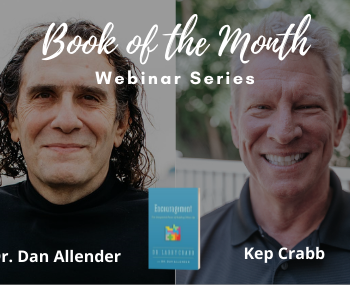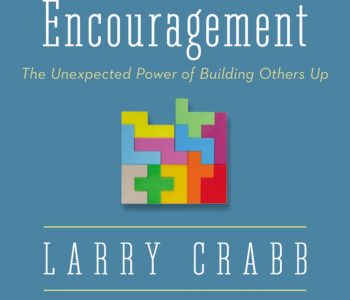 Video
Video
 Video
Video
 Video
Video
According to Drs. Larry Crabb and Dan Allender, encouragement is more than a compliment or a pat on the back. It’s a skill that can be mastered by anyone. Crabb and Allender ask: “What must we know in order to fulfill the biblical exhortation to ‘encourage one another?'” Encouragement provides the answer.
Part one deals with understanding encouragement, and part two explores the process of encouragement, including such practical how-tos as developing a careful selection of encouraging words; cultivating active listening skills; using biblical fellowship to move beyond superficial smiles and shallow greetings; and recognizing subtle opportunities for encouragement.
Without the encouragement of a caring community, biblical truth taught in church tends to just thicken people’s defense layers. But authenticity, freedom, and greater love for God and others are the fruit of encouragement, and evidence of the tremendous power God invests in individuals who practice it.
Order the book here: https://store.largerstory.com/products/encouragement-the-unexpected-power-of-building-someone-up
 Message
Message
 Message
Message
Larry describes the fallen structure in every human being and how to disrupt the bad, sin, and affirm the good, trusting God.
 Message
Message
Two ways to grasp the secret of contentment. 1) Our relationship with each other should substantially reflect the relationship we have with Christ. 2) Our conversations should not contradict the truth that we can do all things through Christ who gives us strength.
 Message
Message
Men who provoke curiosity pant after God, admit their own sin and follow hard after God. Larry used the Passover, Deuteronomy 6 instructions to fathers, and Joshua 4 instructions about the twelve stones to drive home his point.
 Message
Message
Larry begins with illustrations of illegitimate discouragement and ways to engage the discouraged. His two points in this tape are the power of presence and words to encourage others. Want to see more encouragement in community? Start with a few people.
 Message
Message
There is a profound need for encouragement in the body of Christ. Programs don’t usually work to create a community of encouragement. Encouragers affirm courage and perseverance, and call forth potential.
 Blog
Blog
A friend of mine is right now fighting the battle of his life – and at this moment he is losing. The dark side seems to be winning. He has turned his back on his wife and children and ministry in order to keep experiencing the satisfaction he is finding in relationship with another woman. The satisfaction is not sexual. That would be easier to explain and argue against.
He describes his experience as soul joy, the profound sensation of feeling alive, free, connected, and wanted. It is an intensity of fulfillment that he does feel, that decades of (as best he knew) seriously and fervently following Christ has never provided. He sees himself as built for this joy, and can recognize only two options: pursue the experience and walk away from what he has always understood the Bible commands or come back to the Christian fold and give up all hope of deep joy in this life. That’s how he sees things. How should I respond? How should I pray? How should the community of family and friends that love him and cannot and should not give up on him – respond? How should we pray?
As a younger man, I can recall persuading myself that the clean pleasure of coming home to my wife having not looked at pornography on the hotel television was enough to keep me on the straight and narrow path. The argument is typically “Christian”: the felt joys of obedience exceed the felt pleasures of sin. We hear it all the time.
But that’s true only when, as in my case, I really like my wife. As long as I have blessings that I sincerely enjoy, then the moral path allows me to keep on enjoying those blessings. But notice, the joy is not the enjoyment of God. It is the enjoyment of blessings. Remove the blessings, give the man a wife that for whatever complex of reasons he does not enjoy, and the pleasures of sin may exceed the pleasures of holiness.
The old hymn says “There is joy in serving Jesus”. And there is. But if we are counting on an experience of soul satisfaction to reliably accompany obedience and if we expect that our felt pleasure in doing good will exceed the pleasure we could enjoy by indulging our favorite sin, then it won’t take long till sin will seem irresistible.
Here’s the point: if we live for an experience of joy, if we elevate desire to central status and live for nothing higher than its felt satisfaction, then we no longer are living by faith. We are idolaters worshipping desire. We are no longer living for God.
I agree with Jonathan Edwards that there is no incompatibility between our unquenchable longing for happiness and the command to worship God. But if God becomes the means and our happiness becomes the point, then we are self-obsessed pragmatists, not worshippers. When God is the point and obedience designed to bringhim pleasure becomes the focus, then there will eventually be a fullness of joy that makes sin unthinkable and unappealing, thoroughly repulsive.
But that fullness of joy comes later, in heaven. In this life, it’s more about hope than about joy. Joy now is wrapped up in communing with the Son in His delight in the Father, communing with the Father in his exaltation of the Son, and communing with the Spirit in His obsession with seeing the Father and the Son glorified. But that joy, though real and growing, will not be complete until we are literally in the presence of the Trinity, dancing forever in perfect rhythm and unspeakable ecstasy (See Eph. 3:19). In this life, now, it’s by faith that we live, by faith that joy is in Jesus, even when following him yields suffering. Of course there are seasons of great joy, and there is an abiding sense that we belong to the most wonderful Person in the universe, that the privilege of knowing him really does exceed all other blessings whether we feel it or not, and that living for him is what we most want to do. But if we’re living for the maximum sense of pleasurable satisfaction now, we will obey God only if he provides blessings that obedience allows us to continue enjoying. Take away the blessings and live life to gain satisfaction of even the noblest human desires and eventually you’ll find yourself moving away from God.
One prevailing heresy in evangelical culture is that living for Jesus reliably provides the soul with a depth of satisfaction that exceeds the satisfaction found in sin. It is that heresy that keeps a pastor I know driven in his ministry. He works long hours, he studies hard, he is well disciplined in his habits, his church is growing, he is highly respected – and he keeps living the “Christian” life because it keeps him feeling important and alive. He is living for satisfied desire, not for God. It just so happens that what we would call a Christian lifestyle provides him with enough pleasure to keep him going. So he does, like a rat on a treadmill, feeling a weariness that he mistakes for the cost of discipleship.
Let him become honest enough to face the emptiness in his soul that every self-aware pilgrim feels (the Bible calls it groaning) and, at the same time, keep him believing the lie that serving Jesus is supposed to relieve emptiness, and you have a pastor ripe for an affair, or further burnout or an extra dose of legalism. Satan has a golden opportunity to bring along just the right woman that can become his soulmate, (really his fleshmate), and the appeal will be experienced as irresistible. Or the pastor will become disillusioned and drop out, or he might become more rigid and relationally aloof, and more driven and demanding in his role as spiritual leader.
We’re trying very hard in Christian circles to convince ourselves that even without the prospect of heaven, the Christian life is worth living. It’s not. Unless, like me, you’ve been blessed with a spouse you genuinely like, kids who delight your heart, a job or ministry that provides both meaning and income, and decent health. Then keeping your nose clean makes sense as long as the blessings keep coming. Why give up the enjoyment of what you have? Christian living then is pragmatically smart.
But mess with the blessings, let just enough go wrong to reduce the pleasure you feel in them to a lesser intensity than the pleasure that comes from bagging Christian standards and doing whatever makes you feel alive, and doing wrong will seem justified, necessary, legitimate, reasonable. The wrong way will seem right. That scenario has led to countless divorces.
The real battle in the human soul that knows Jesus is not to find a way to feel now what we long to feel in our inmost being, whether it’s love, meaning, or the satisfaction of living an other-centered life in the service of a cause greater than oneself. The real battle is to continue on in faithfulness even when faithfulness brings no immediate experience of joy, even when it brings no prospect of felt joy until heaven. That’s what it means to live by faith. That’s the message of Hebrews 11. That’s the cornerstone of the gospel, first declared by Habakkuk when he quoted God saying, “The just shall live by faith” (Hab. 2:4), then established by Paul as the core of the spiritual journey.
My friend followed Jesus for several decades. It didn’t “work”. He hoped that he would feel an overwhelming satisfaction that would make resisting sin as easy as passing by dog food for prime rib. He believed the prevailing heresy of the evangelical church that the experience of satisfaction is for now, that living by faith does not delay satisfaction in hope, but provides satisfaction in experience. He discovered that a woman who it was not God’s will for him to fully enjoy provided more soul joy than anything he had known in years of faithfulness to the will of God. For him, the call to obedience meant giving up joy and returning to lifeless Christianity.
He was not helped by the erroneous but popular teaching that there is a way to feel so alive in God that sin loses its appeal, and that pursuing the experience of aliveness is the legitimate center of the spiritual adventure. That teaching is deadly, all the more so because it’s so near the truth. Knowing God is life. But living to feel alive is not the same as living to know and glorify God. When the bottom line is reached, the issue is not finding an experience of overwhelming joy in knowing Jesus. That will happen later. It may happen now. If it does, praise God. When the bottom line is reached, the issue is faith: what do you most deeply believe? How then shall you live? Heaven is coming up. Only that fact makes sense of the choice to persevere when blessings are withheld, when emptiness is seemingly unending, when anguish of soul eclipses even the prospect of joy.
Fighting the Battle through Prayer
If the real battle is to keep from making an idol of desire, if the real battle is to let our choices be ruled by a desire for God that sometimes leaves us empty and lonely, then, though we can rightly celebrate whatever blessings come our way and enjoy the pleasure they bring, we must never deposit that pleasure in the bank and write checks on that account. We must rather hope in Christ when life makes no sense, when sin does a better job of relieving emptiness than righteous living. We must write checks on the account of faith. Our hope must be fixed on Jesus, and the hope his presence brings, not on satisfied desire in this life.
With that slowly growing understanding of the battle going on in me and in my brother, I must pray. I must engage in battle prayer, the kind that is carried along by the recognition that the spiritual battle is between the demand for felt satisfaction and the life of faith.
My version of prayer as battle is to imagine my friend in the presence of the Trinity and to eavesdrop on their conversation. I claim to hear neither audible voices nor inerrant messages. I simply reflect on what I know of God as revealed in Scripture – the Father’s unconditional love, the Son’s atoning grace, the Spirit’s gentle rhythm – and I imagine what they are right now saying to my friend and how they are feeling and thinking about him. Whatever impressions come to mind, I register, ponder, and try to put into words.
I pray for my friend who is about to throw away a life of faith for the experience of satisfied desire. I do not pray that he feel more joy in following Christ than in sin. I pray that he would get in touch with a longing to know God that is stronger than his desire for a present experience of joy and life. I imagine him in the presence of the Trinity. I sense their pain as their child values the experience coming from a woman who is not his wife over the hope they have promised, the hope that it cost the death of Jesus to provide.
I spent an evening telling him what I heard. He called me a day later. He told me he was ending his relationship with this woman. His words were, “I can explain my decision only as the work of God in answer to prayer. It feels awful but in some strange way, it’s what I want to do.” I since have been told he has re-entered his fleshmate relationship.
I’m afraid the heresy is still alive in his mind, that he may still believe that the choices we make should be determined by the joy they will bring in this life. Does he think he’ll feel better after giving up the other woman? That he’ll experience a fullness of joy that will make the pleasure he enjoys with the other woman pale in comparison? And does the other woman sincerely believe she is entering a relationship with a strong man who will pour strength and life into her soul? I don’t know. Will he in fact give her up? Or will he go back to her when he discovers that his soul experienced more aliveness with her than in following God? Again, I don’t know.
So I keep praying. Prayer is battle.
 Blog
Blog
When I was in private practice as a psychologist, a counselee would sometimes sense a door was opening into a long denied terror. And it was the fear of facing fear that would bring on what felt like a life or death struggle. In a quivering voice the counselee would then say, “If I let myself feel what scares me the most, I think I’d start crying and never stop.”
The writer to the Hebrews told us that Christ has :
“set free all who have lived their lives as slaves to the fear of dying.” (Hebrews 2: 15 NLT).
For humans made in God’s image to live alive with God and for God, the fear of dying can be understood as the terror of living without love or meaning, the dread of an existence unprotected from troubles that could destroy all hope of deep satisfaction.
Right now, God’s ways are not making sense to me. Significant prayers, defined as requests not for health or wealth or success or recognition but only for the basics needed for me to feel safe from practical and emotional disaster, for some time have gone unanswered. I find myself enjoying a good television show more than God. I’m not in a good place.
Last night I picked a book off my shelves that I hadn’t read, a book I have no memory of buying. It’s a novel by G.K. Chesterton, one of my favorite authors, a book titled The Ball and the Cross. It’s a fanciful allegory about someone who believes in God arguing with an atheist. The Cross, of course, is the symbol of Christianity; the ball represents the globe, the world peopled with both Christians and atheists.
Early on, Chesterton has a godly man suspended above the ball desperately hanging on to a cross, swinging above “the sickening emptiness of air”. If the cross doesn’t support him, he will fall into nothingness, a pointless existence. Chesterton describes this man’s experience in a way that revived something in me. The man suspended by a cross above the ball
“… felt in the taut moment of such terror that his chief danger was terror itself… His one wild chance of coming out safely would be in not too desperately desiring to be safe” (my emphasis).[1]
I read this into Chesterton’s phrase: one chance of coming out safely from an unmanageable, soul-threatening challenge to faith in God “would be in not too desperately desiring to be safe.”
An old truth is coming into clearer focus. When I insist on feeling safe, I risk living in the darkness of fear that danger could destroy me. Things might not work out as I want them to, and I could be intensely discouraged. My desperate desire for safety, a demand for God to provide the basics necessary for me to feel safe, strengthens my fear to face what I fear that could leave me desolate. And that fear impels me to deny the darkness of potential desolation, a darkness that could weaken my faith in God when He makes no sense, when He remains unresponsive to my “reasonable” requests for what would let me feel safe.
But that darkness could be my friend. I think that is Chesterton’s point. Darkness is my best opportunity to see light, but only when I give up the desperate desire to feel safe on my terms. Of course I’ll tremble when God’s ways make no sense. The passion of my demanding spirit of entitlement could lead me as I tremble into the quagmire of resentful resignation. Or legitimate trembling over life’s disappointments and difficulties could lead to settled trust that somehow His sovereign love is working all things together for the good that He understands to be my deepest good, what I long for the most, to know God and to rest in His sovereign goodness and love. Maybe the Cross will do what needs to be done. I’m betting on it.
I hope my counselees from years ago have come to know what now encourages me: if I let myself feel what scares me the most, I can seize the opportunity of darkness to believe that God is shining light on a path that leads to life. I might cry, buy not for long.
[1] G.K. Chesterton, The Ball and the Cross, Dover Publications, N.Y., first published in 1909-1910; republished 1995 p8.